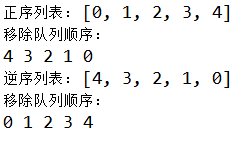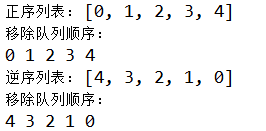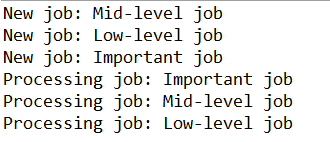Queue—线程安全的FIFO实现
作用:提供一个线程安全的FIFO实现
Queue模块提供了一个适用于多线程编程的先进先出(first-in,first-out)数据结构,可以用来在生产者和消费者线程之间安全地传递消息或其他数据。它会为调用者处理锁定,使多个线程可以安全第处理同一个Queue实例。Queue的大小(其中包含的元素个数)可能要受限制,,以限制内存使用或处理。
1、 基本FIFO队列
Queue类实现一个基本不能的先进先出容器。使用put()将元素增加到序列一段,使用get()从另一端删除。
1 import Queue 2 3 q = Queue.LifoQueue() 4 a= range(5) 5 print u'正序列表:',a 6 for i in a: 7 q.put(i) 8 print u'移除队列序列:' 9 while not q.empty(): 10 print q.get(), 11 print 12 13 a= range(5) 14 a.sort(reverse=True) 15 print u'逆序列表:',a 16 for i in a: 17 q.put(i) 18 print u'移除队列序列:' 19 while not q.empty(): 20 print q.get(), 21 print
显示结果:

这个例子使用一个线程,来展示按元素的插入顺序从队列删除元素。
2、 LIFO队列
与Queue的标准FIFO实现相反,LifoQueue使用了后进先出(last-in,first-out,LIFO)顺序(通常与栈数据结构关联)。
1 import Queue 2 3 q = Queue.Queue() 4 a= range(5) 5 print u'正序列表:',a 6 for i in a: 7 q.put(i) 8 print u'移除队列顺序:' 9 while not q.empty(): 10 print q.get(), 11 print 12 13 a= range(5) 14 a.sort(reverse=True) 15 print u'逆序列表:',a 16 for i in a: 17 q.put(i) 18 print u'移除队列顺序:' 19 while not q.empty(): 20 print q.get(), 21 print
运行结果:

get将删除最近使用put插入到队列的元素。
task_cone()
在完成一项工作之后,Queue.task_done() 函数向任务已经完成的队列发送一个信号
Join()
实际上意味着等到队列为空,再执行别的操作
3、 优先队列
有些情况下,队列中元素的处理顺序需要根据这些元素的特殊性来决定,而不只是在队列中创建或插入的顺序。例如:财务部门的打印作业可以能要优先于一个开发人员打印的代码清单。PriorityQueue使用队列内容有序顺序来决定获取哪一个元素。
1 import Queue 2 import threading 3 4 class Job(object): 5 def __init__(self,priority,description): 6 self.priority = priority 7 self.description = description 8 print 'New job:',description 9 return 10 def __cmp__(self,other): 11 # print 'a:',self.priority 12 # print 'b:',other.priority 13 # print cmp(self.priority,other.priority) 14 return cmp(self.priority,other.priority) 15 16 17 q = Queue.PriorityQueue() 18 q.put(Job(3,'Mid-level job')) 19 q.put(Job(10,'Low-level job')) 20 q.put(Job(1,'Important job')) 21 22 def process_job(q): 23 while True: 24 next_job = q.get() 25 print 'Processing job:',next_job.description 26 q.task_done() 27 28 workers = [threading.Thread(target = process_job,args = (q,)), 29 threading.Thread(target = process_job,args = (q,)), 30 ] 31 for w in workers: 32 w.setDaemon(True) 33 w.start() 34 q.join()
运行结果:

这个例子有个多线程处理作业,要根据get()时队列中元素的优先级来处理。运行消费者线程时,增加到队列中的元素的处理顺序决定于线程上下文切换。